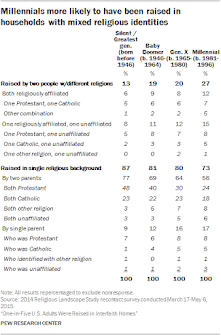 On Votaries today, I wrote about dissenters and atheists.
On Votaries today, I wrote about dissenters and atheists.
The question here is: How important is religion to a marriage?
The question can be split into at least two parts:
- How many marriages these days are interfaith (intermarriages) versus a single faith (intramarriages)?
- Does interfaith versus intrafaith make any difference?
According to the Pew Research Center, most people marry people of the same faith. The number of interfaith households has increased--but honestly not as much as I anticipated.
Some religions do encourage same faith marriages. And many people place agreement over religion above agreement over other things, like politics.
However, it is also quite likely that people end up marrying within the same faith because those are the people they know. As Patrice Heller and Beatrice Wood point out in "The Influence of Religious and Ethnic Differences on Marital Intimacy: Intermarriage versus Intramarriage," "[S]alient categorical homogeneity--that is, when a couple shares the same meaningful religious and ethnic group affiliations--usually deepens attractiveness of a potential marital relationship" (242).
In other words, we are all incredibly self-centered and want to be with people who remind us of us--or, to be less cynical, with people with whom we are comfortable.
However, interfaith marriages are not therefore automatically less intimate (intimate being defined here as closeness within the marriage). While intramarriage couples share a common "language," the significant others also run the risk of making assumptions about each other when they "project similarity and agreement about a host of issues." On the other hand, while intrafaith couples may lack a similar "frame of reference for negotiating differences," they do negotiate more and carry out "self-disclosure" (242-243).In sum, the marriage's success is all about the couple.
The article (full reference below) does a decent job of addressing the underlying issue: namely, people who participate in studies are...people who participate in studies. An intramarried couple who participated in this study (I would suggest) would already be fairly confident that religion binds them together while an interfaith couple who participated in this study would already be fairly confident that their differences don't preclude agreement in other ways and can be handled through discussion.
After all, that's what the researchers discovered!
Even more interesting, however, was that the researchers found that education (class) wasn't necessarily the fall-back "similarity." At the end of the article, they suggest more research is needed.
I always appreciate non-self-help-book research that explore issues that are taken for granted.
Heller, Patrice and Beatrice Wood. "The Influence of Religious and Ethnic Differences on Marital Intimacy: Intermarriage versus Intramarriage." Journal of Marital and Family Therapy, vol. 26, no. 2. April 2000, 241-252.
